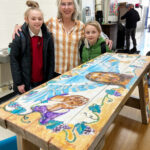By Barb Arland-Fye
The Catholic Messenger
Bryan Anderson lost his legs and one hand in Iraq, but the triple amputee war veteran demonstrated agility and resilience during his Feb. 25 talk at St. Ambrose University in Davenport. A former high school gymnast, he gestured broadly with his arms and hoisted himself effortlessly from the seat to the top of his wheelchair and then lowered his body to the seat.

Bryan Anderson, who lost his legs and one hand in Iraq, speaks at St. Ambrose University in Davenport Feb. 25.
Upbeat, he deployed an arsenal of humor in his keynote address at the inaugural Eastern Iowa and Western Illinois Veterans Conference in the university’s Rogalski Center. The Chicago area native identified an “elephant in the room: I don’t have legs” to assure the audience of about 260 military personnel, veterans and civilians that he and they shouldn’t be afraid of one another.
Anderson took the audience with him, back to October 2005 in Iraq in the driver’s seat of an Army truck. That’s where an Improvised Explosive Device (IED) blew off his legs and one hand and maimed the other hand. The details he recalled from those awful moments — trying to swat a fly with his hand, only to discover he no longer had that hand — riveted his listeners.
After his Army buddies had gotten him out of the truck and laid him on the ground, he realized he had no legs, but he didn’t expect death. In fact, Anderson made a joke with his rescuers — which he believes inspired them to tie the best tourniquets ever. It hurt terribly to breathe, but he knew it was essential to take even the shallowest of breaths to remain alive. He lost consciousness in the helicopter where he had been taken for transportation to the hospital. When he awoke, he saw his mother’s face and wondered why the heck they had brought her to Iraq. She informed him that he was at Walter Reed Army Medical Center in Washington, D.C., and had been there for seven days.
His whole family showed up at the hospital — mom, dad, twin brother and little sister — underscoring the love and support that allowed him to take each day at a time, he told his audience. Four months into his recovery, Anderson became depressed. The emotion welled up. He didn’t want to be alone and he didn’t want to talk to anyone. That lasted about two weeks. Then he realized he hated being depressed. He was determined to make life enjoyable.
A sense of humor kept Anderson buoyed. While convalescing at Walter Reed, he and another patient who’d lost his legs managed to get into a car and drive it to Georgetown: Anderson operated the steering wheel, while his buddy, on the floor, operated the gas and brake pedals. The drive was rough, but they worked out communication to get them to their destination and back.
As they pulled into Walter Reed, an unsuspecting guard at the gate informed Anderson that the car was being pulled over for a random inspection. The amputee described the shock on the guard’s face when he opened the car door and asked Anderson to step outside!
Although the decorated Army vet did not speak of religious faith, one of the conference organizers believes Anderson embodies a message of hope that Pope Francis lives and preaches.
“The message I got and the things that stuck with me from hearing him talk is that there really is that little nugget of hope and perseverance in us all. He grasped a hold of that hope and found a way to propel himself forward,” observed Andrew Gates, a veteran who serves as coordinator of Veterans Recruitment and Service for St. Ambrose University.
Anderson joined the Army to be “a part of something bigger than myself.” Today that means setting an example, encouraging other vets to not give up hope, to find a sense of purpose no matter what has happened to them.
“The renaissance man,” as Gates describes him, also helps bridge the divide between the military and civilians. “What we were trying to do (with this conference) is to create constructive dialogue between military and civilians and ways to bridge the divide. One thing in particular, we should focus on dispelling myths that people have about people who have served in the military,” Gate says.
For example, civilians have a media-spawned perception that all people who return from military service are broken or struggle with posttraumatic stress disorder (PSTD). That’s not necessarily the case, Gates adds.
The conference also sought to answer the questions: “How are we serving our veterans best when they get out of the military?” “How are we facilitating their re-entry into civilian-hood?”
Anderson later spoke to students in St. Ambrose University’s physical therapy and occupational therapy programs, Gates said. “He was showing these students that being in a wheel chair – that’s not what defines him.”
About Bryan
Bryan Anderson is a “renaissance man,” declared Andrew Gates, a veteran who serves as coordinator of Veterans Recruitment and Service for St. Ambrose University. Anderson, a triple amputee and Iraq war veteran, penned his memoir “No Turning Back.” He appeared in a Golden Globe-winning movie, The Wrestler and had a part in an episode of the TV series CSI:NY. He’s been featured in Esquire magazine, USA Today and in Captain America comic book. He’s a spokesman for a wheelchair company. He skateboards, snowboards, wake boards, white water rafts and rock climbs. He’s also a spokesman for USA Cares, a nonprofit organiza











